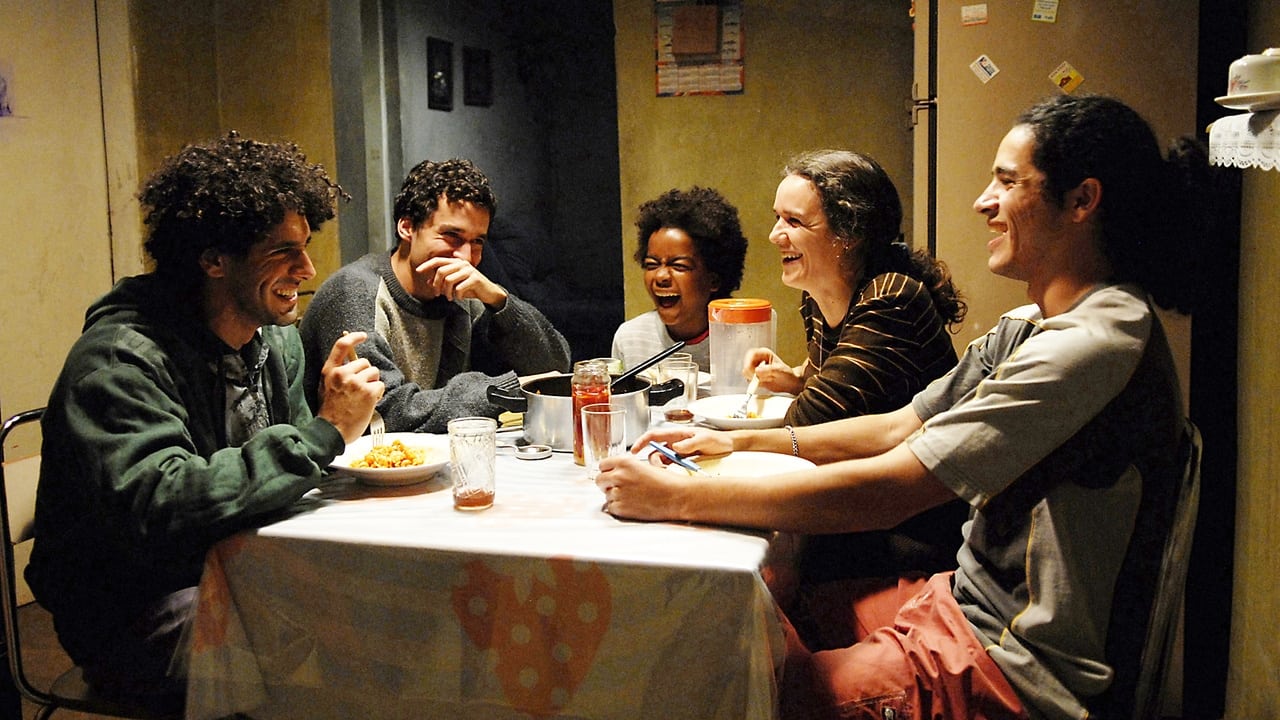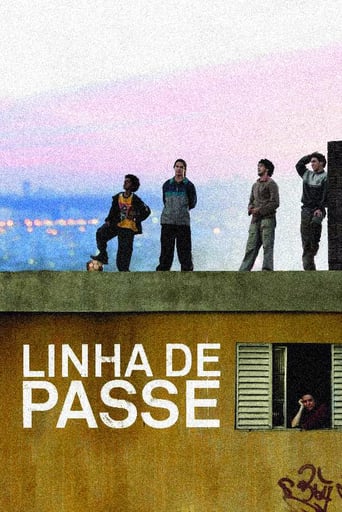

Salles never disappoints, and his film "Linha de passe" is no exception. The movie tells the story of a middle class mother raising four boys in a large and unforgiving neighborhood in São Paulo, Brasil. Unlike Salles' most famous movies, "Linha de passe" does not tell a story of a hero or of a dramatic and impressive story of people overcoming extreme circumstances. It is a pure and undramatized story of a single-parent family just "getting by." The acting is believable to the point it is difficult to imagine the actors as anyone else but their characters. The writing is impressive, with five stories depicted and developed yet there is an amount of inconclusiveness left up to the imagination of the audience. It seems as though this story was received by Brazilians as being true and honest to what a picture of the typical life of a family in Brazil. As an American, I appreciated the apparent authenticity of the movie as shown through the excellent cinematography and writing. I would definitely recommend this movie.
... View MoreThis collaboration between Walter Salles (Central Station, The Motorcycle Diaries) and previous co-director Daniela Thomas provides a look at the struggles of urban Brazilian youth without melodrama or ultra-violence. (Salles saw Fernando Meirelles and Kátia Lund's City of God as an impressive film but one that misled the public into thinking every Brazilian kid packs an AK-47.) The texture of the film is gritty, but attractive. Like the boys in Visconti's Rocco and His Brothers, the focus is on the sons in a family who have a natural glamor, but are presented in a neorealist style. Linha de passe is a term for passing a soccer ball from one player to another without its touching the ground. An English language title hasn't been found yet; the French used simply Une famille brésilienne/A Brazilian Family. The film is engaging, if a bit chaotic. The May-through-September time-lined structure helps add organization, but the effort to move constantly back and forth among five different characters and scenes becomes wearying toward the end, though the lack of any resolution certainly is an honest reflection of the protagonists' near-hopeless lives.Living in the slums of São Paulo, the country's most populous city, Cleuza (Sandra Corveloni, who won the Cannes Best Actress award in 2008 for this performance) is a hard, spirited woman who smokes, works as a housekeeper, and keeps having sons by different men. Cleuza is an obsessive soccer supporter with four boys, none of whom knows who his father is. She's pregnant again, and when her mistress notices, she edges her out by hiring another woman to replace her. Cleuza's youngest, Reginaldo (Kaique de Jesus Santos), who is black, is intent on resolving the mystery in his own case. He believes his dad is a bus driver and so spends all his spare time riding buses, befriending drivers, and learning how to drive a bus. His final exploit of stealing a bus and driving it off on his own, designed to draw attention to himself and thus lead him to his father, is based on a true story.Reginaldo is feisty, handsome, and precocious and his exploit is amazing, but the film balances its attention among each of the sons. Dario (Vinicius de Oliveira, who when very young starred in Salles' Central Station) is a talented soccer player who wants to make it on a commercial team. But having just reached 18 he is at the limit for hiring of newbies; when he finally finds a coach still interested in his impressive ball handling, shooting and (with prodding) teamwork, he finds out he has to come up with a big "tip" to get the team official to ease him in. Dinho (José Geraldo Rodrigues) works at a gas station, but his life revolves around evangelical Christianity. He's had some badness in his past, but is determinedly righteous now. Dênis (João Baldasserini), the oldest, has a small boy he very seldom sees and cannot provide support for as a motorcycle messenger. He is still paying for the bike. This need for money leads him to crime.The settings are real and gritty and the main actors, save Vincius, had no previous experience. All this contributes to the vigor, spirit, and naturalism of a narrative that grounds its drama in sociology. It begins with the statistical fact that a large percentage of São Pauolo's children are fatherless. There is little sense of social organization or services here.Dênis' momentary turn to theft and carjacking leads the film as far as it ever goes into Hollywood actioner territory. Meanwhile Dinho is having his faith tested and seriously losing his cool, little Reginaldo is moving up to joy-riding a giant bus, and Dario, who earlier went on a dangerous drug and alcohol spree in frustration, is seemingly getting that big break on the soccer field, but his lack of money to bribe the manager may doom his chances. Everyone is moving boldly forward, hopeful in the face of despair. One ends the film feeling wrung out and uncertain. Salles has become seemingly more realistic but also more pessimistic by now than he was when he made the emotionally moving but somewhat saccharine 'Central Station,' and he does not wreathe his ghetto youths in mist as he does the Che Guevara of 'The Motorcycle Diaries.' This is a valiant effort, with many engaging elements, but the final effect is somewhat lukewarm.The editing by Gustavo Giani and Lívia Serpa is unfailingly clear; it is not their fault if the focus on five plot lines at the end of the film becomes a little overwhelming, and ultimately numbing. If this is the influence of Iñáritu, that is always a dangerous one.Premiered in May 2008 at Cannes, 'Linha de Passe' is still unreeling in various countries. Seen at the San Francisco International Film Festival May 29, 2010. In the dual-theater projection, an unfortunate staple at the SFIFF, the print did not look very good; presumably a fault of the projection and not of highly experienced d.p. Mauro Pinheiro Jr.
... View MoreAbsolutely outstanding film. A slice of sometimes gritty, sometimes funny, sometimes boring life in Sao Paolo seen through a lens. Much as I enjoyed City of God and other similar 'favela' style films, having been to Brazil I do get the impression that they sensationalise a certain lifestyle that just doesn't apply to your average city-dwelling Brazilian. Which is partly why I loved Linha de Passe - there was no gun-toting gangsters, just a single parent family struggling with the day to day Sao Paolo life. And lots of football. The main characters were magnificent - all of the sons and the mother were just so incredibly believable that you feel that they can't possibly be actors. The cinematography was beautiful - the football scenes didn't feel clichéd and the urban environments were used to stunning effect.Linha de Passe isn't something you're going to enjoy if you need a film with a parcel-wrapped storyline dressed up with a pretty ribbon on top. It just offers you an often moving glimpse of what feels like very real life in one of the most populous cities on earth.
... View MoreThis movie is similar to Walter Salles' "Central Station," in that it shows a part of Brazilian life that people know very little about: the poor suburbs of the big cities. This time, he looks at a family living on the outskirts of Sao Paulo and the everyday struggles they face. Salles shows what life is like for the poor in Brazil without the in your face violence from "City of God" but with the same grace and humor as Central Station. Part of the success of the film are the wonderful actors, who turned a decent script into much more. Sandra Corveloni won Best Actress for the film at Cannes, and Vinicius de Oliveira, famous for his amazing performance as a child in "Central Station," plays one of Sandra's sons. Kaique Jesus Santos plays Sandra's youngest son, who equals Vinicius' "Central Station" performance. Don't expect an action movie or love story, but do expect the chance to get a glimpse of the real Brazil.
... View More